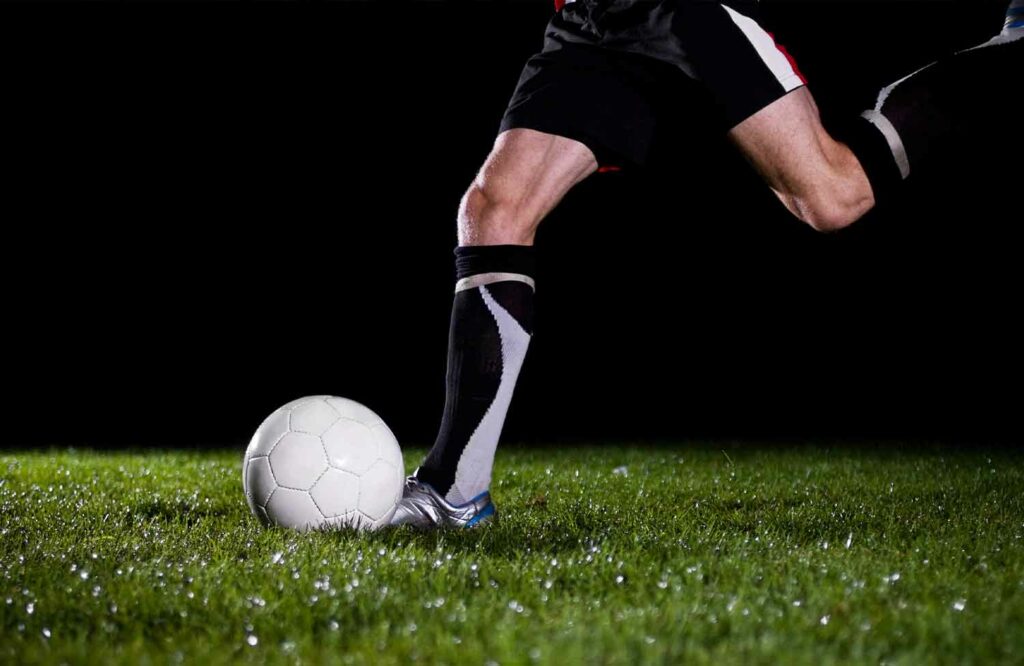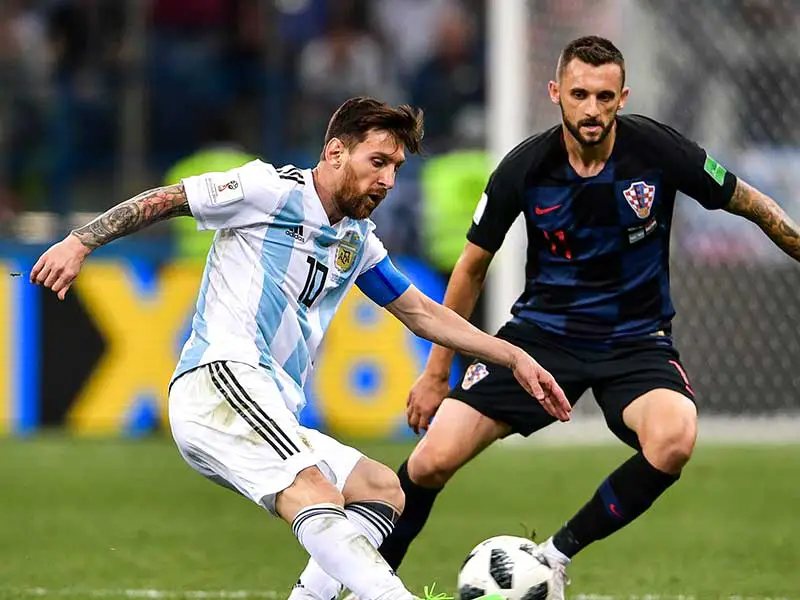How Fast Can Soccer Balls Be Kicked?
Soccer, or football as it is known in many parts of the world, is a sport that is enjoyed by millions of people around the globe. It is the most popular sport in the world and there are many parts of it fans get excited about.
One of the most thrilling aspects of the game is the power and speed of the kicks that players are able to achieve. Those thunderous strikes can awe the fans and be the talking point for days, if not years on some occasions.
But just how fast can soccer balls be kicked, and what factors affect their speed? In this article, we will delve into these questions and more, taking a closer look at some of the fastest kicks ever recorded, as well as the benefits of being able to kick the soccer ball with power and precision.
What Was The Fastest Recorded Soccer Kick?
The fastest kick ever recorded in a professional soccer match is believed to have been achieved by Ronny Heberson, a former defender for Sporting Lisbon. During a Portuguese Primeira Liga match against Associacao Naval 1 de Maio in November 2006, Ronny unleashed a shot that was clocked at an nearly impossible to believe 131 mph (210 km/h).
This is an extraordinary feat, considering that the average speed of a professional soccer kick is around 70 mph (113 km/h). In fact, Ronny’s goal is here for you to take a look, considering just how incredible that thunder of a shot was:
What Are The Fastest Kicks Ever?
Other players who have been known to produce some of the fastest kicks in the game include Cristiano Ronaldo and Lionel Messi, who is known for his incredible ball control. But among the fastest kicks ever recorded, there are other players who come close to the top of the list. In fact, only the top five shots, including Ronny Heberson, have gone above the 100 mph mark. Here are the top 10 fastest soccer kicks ever recorded:
- Ronny Heberson – 131 mph
- Arjen Robben – 118 mph
- Steven Reid – 117.4 mph
- Ronald Koeman – 116.8 mph
- David Hirst – 114 mph
- David Beckham – 97.9 mph
- David Trezeguet – 96 mph
- Richie Humphreys – 95.9 mph
- Tony Yeboah – 95.7 mph
- Zlatan Ibrahimovic – 93.3 mph
What Factors Affect The Speed of the Soccer Ball?
There are numerous factors which can affect the speed of a soccer ball when it is kicked. They range from factors players can affect to those outside of their powers. These include:
The strength and power of the player’s kicking leg
The stronger and more powerful a player’s leg muscles are, the faster they will be able to kick the ball.
The technique and form of the player
The way a player strikes the ball can have a big impact on its speed. For example, if a player uses their laces to strike the ball, it will typically travel faster than if they use the inside or outside of their foot. The players possess far more power in the central part of their foot.
The surface of the field
The type of field that the ball is kicked on can also have an effect on its speed. A ball kicked on a hard, flat surface will typically travel faster than one kicked on a softer, grassy field. Also, in professional football, a ball can travel faster on a more slippery grass field, where rain can have its influence.
The condition of the ball
The material and construction of the ball can also play a role in its speed. For example, a ball with a lower air pressure will typically travel slower than one with a higher air pressure. Also, good weather conditions are better for the powerful shots, as the rainy conditions can make the ball a bit heavier, thus making it harder for it to travel at incredible speeds.

What Are The Benefits of Kicking the Soccer Ball Fast?
Being able to kick the soccer ball with speed and power can bring a number of benefits to a player and their team. Apart from them being pleasing on the eye, for fans all over the world to enjoy, they are also quite practical. Some of the main benefits include:
Scoring goals
The faster you kick the ball, the harder it is for the opposing goalkeeper to save it. This means that players who are able to kick the ball with speed have a greater chance of scoring goals. But there is also a caveat – your shot still needs to be precise enough.
Creating scoring opportunities
Even if a fast kick doesn’t result in a goal, it can still create scoring opportunities for other players. For example, a goalkeeper can save a fast shot, but that shot may result in a rebound, for another player to come in and capitalize on. Or a quick and fast long pass can cut a defense open and give the opportunity to your teammate in attack.
Intimidating opponents
Players who are known for their powerful and fast kicks can also intimidate their opponents, making them less likely to challenge for the ball. For instance, Sinisa Mihajlovic once struck a ball so hard during a World Cup match, German striker Jurgen Klinsmann stayed on the ground in a semiconscious state after getting hit.
“The ball struck me in the liver, and it was very painful. For a few seconds, I didn’t know where I was”, Klinsmann said after recovering from the ferocious shot back in 1998. That is why Mihajlovic’s free-kicks instilled fear in opposing players.
How Fast Can Cristiano Ronaldo Kick A Soccer Ball?
Cristiano Ronaldo is widely regarded as one of the greatest soccer players of all time, and his ability to kick the ball with power and precision is a big part of his success. Ronaldo has been clocked at speeds of up to 80 mph (129 km/h) when kicking the soccer ball, making him one of the fastest kickers in the game. In fact, this speed was recorded in a 2011 documentary he took part in, called ‘Tested to the limit’.
How Fast Can Lionel Messi Kick A Soccer Ball?
Like Ronaldo, Lionel Messi is known for his incredible ball control and ability to score goals. Messi has been recorded kicking at speeds of up to 78 mph (125 km/h), which might not seem too fast compared with some of the top speeds mentioned above. But with his control of the ball and ability to send more precise shots than other players, Messi’s shot speeds are fast enough for goalkeepers anyway. No wonder he scored close to 800 goals in his career.

How Fast Can A Woman Kick A Soccer Ball?
While men tend to be able to kick the soccer ball faster than women due to their generally larger and stronger leg muscles, there are still many female players who are able to kick the ball with impressive power and speed.
The reasons for women not being able to kick the ball as fast as men were found in scientific reports, citing the fact women use distinct leg and hip muscles while shooting the ball. But still, you would not want to get hit by a professional women’s soccer player. Some of the fastest kicks by female players were recorded at speeds of around 60 mph (97 km/h).
How Fast Can A Youth Player Kick A Soccer Ball?
The speed at which a youth player is able to kick a soccer ball will depend on a number of factors, including their age, physical development, and amount of training. However, even young players can still kick the ball with impressive speed, with some youth players able to achieve speeds of around 50 mph (80 km/h) or more. More generally, kids of different ages could reach 30 to 40 mph (48 to 64 km/h), which is still impressive.
Conclusion
Soccer is a sport that requires a combination of strength, technique, and skill in order to kick the ball with power and precision. The fastest kicks ever recorded in professional soccer matches have reached speeds of up to 131 mph (211 km/h), but even players who are not at the top level can still kick the ball with impressive speed.
With ranging factors which could influence the speed of a soccer ball, there are many things to pay attention to. The players can work on the muscles in their legs, their technique and form of hitting the ball to affect the power of their shots. Sometimes, this will be influenced by other factors, such as the surface of the field or the condition of the ball.
Nevertheless, kicking a soccer ball with speed can still bring a number of benefits to a player and his team. The most important one is to score goals, but also to create goalscoring opportunities and frighten the opponents. Whatever might be the case, watch out to not get hit by a powerful shot unprepared, it can really hurt.
